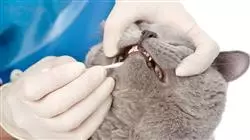University certificate
The world's largest faculty of veterinary medicine”
Introduction to the Program
Delve into all aspects of Epidemiological Surveillance thanks to the best theoretical and practical contents”

One of the most important disciplines in veterinary medicine is epidemiology, which is responsible for the health and welfare of animal populations.
Hence, experts in areas such as Epidemiological Surveillance are increasingly in demand for their specific knowledge in one of the best preventive measures, which is based on the collection and interpretation of results and reports, for the subsequent management and search for solutions.
This is the reason why TECHhas designed a Postgraduate diploma in Epidemiological Surveillance, to generate specialized skills and knowledge in students, so that they are able to face their work in this field with the maximum possible efficiency. To achieve this, this curriculum has a content that addresses issues such as the Determinants of Disease, Data Collection, Population Studies, Animal
Handling or Safety Reports, among other relevant issues.
All this, through the most complete multimedia materials, information based on the most rigorous and updated sources, as well as the latest teaching technologies. In addition, under a comfortable 100% online modality that allows the student to carry out the process with total freedom, without time limits, without the need to travel and without affecting their other daily obligations.
Become an expert in Epidemiological Surveillance in a few months”
This Postgraduate diploma in Epidemiological Surveillance contains the most complete and up-to-date scientific program on the market. The most important features include:
- The development of practical cases presented by experts in Epidemiological Surveillance
- The graphic, schematic and eminently practical contents with which it is conceived gather scientific and practical information on those disciplines that are indispensable for professional practice
- Practical exercises where the self-assessment process can be carried out to improve learning
- Its special emphasis on innovative methodologies
- Theoretical lessons, questions to the expert, debate forums on controversial topics, and individual reflection assignments
- Content that is accessible from any fixed or portable device with an Internet connection
Acquire specific knowledge on Population Studies and Animal Management”
The program’s teaching staff includes professionals from the field who contribute their work experience to this educational program, as well as renowned specialists from leading societies and prestigious universities.
The multimedia content, developed with the latest educational technology, will provide the professional with situated and contextual learning, i.e., a simulated environment that will provide immersive education programmed to learn in real situations.
This program is designed around Problem-Based Learning, whereby the professional must try to solve the different professional practice situations that arise during the course. For this purpose, students will be assisted by an innovative interactive video system created by renowned and experienced experts.
From the first day you will have complete availability of all the materials in the Virtual Campus"

Delve into Crisis Management and Risk-Benefit Analysis without leaving home.”
Why study at TECH?
TECH is the world’s largest online university. With an impressive catalog of more than 14,000 university programs available in 11 languages, it is positioned as a leader in employability, with a 99% job placement rate. In addition, it relies on an enormous faculty of more than 6,000 professors of the highest international renown.

Study at the world's largest online university and guarantee your professional success. The future starts at TECH”
The world’s best online university according to FORBES
The prestigious Forbes magazine, specialized in business and finance, has highlighted TECH as “the world's best online university” This is what they have recently stated in an article in their digital edition in which they echo the success story of this institution, “thanks to the academic offer it provides, the selection of its teaching staff, and an innovative learning method aimed at educating the professionals of the future”
A revolutionary study method, a cutting-edge faculty and a practical focus: the key to TECH's success.
The most complete study plans on the university scene
TECH offers the most complete study plans on the university scene, with syllabuses that cover fundamental concepts and, at the same time, the main scientific advances in their specific scientific areas. In addition, these programs are continuously being updated to guarantee students the academic vanguard and the most in-demand professional skills. In this way, the university's qualifications provide its graduates with a significant advantage to propel their careers to success.
TECH offers the most comprehensive and intensive study plans on the current university scene.
A world-class teaching staff
TECH's teaching staff is made up of more than 6,000 professors with the highest international recognition. Professors, researchers and top executives of multinational companies, including Isaiah Covington, performance coach of the Boston Celtics; Magda Romanska, principal investigator at Harvard MetaLAB; Ignacio Wistumba, chairman of the department of translational molecular pathology at MD Anderson Cancer Center; and D.W. Pine, creative director of TIME magazine, among others.
Internationally renowned experts, specialized in different branches of Health, Technology, Communication and Business, form part of the TECH faculty.
A unique learning method
TECH is the first university to use Relearning in all its programs. It is the best online learning methodology, accredited with international teaching quality certifications, provided by prestigious educational agencies. In addition, this disruptive educational model is complemented with the “Case Method”, thereby setting up a unique online teaching strategy. Innovative teaching resources are also implemented, including detailed videos, infographics and interactive summaries.
TECH combines Relearning and the Case Method in all its university programs to guarantee excellent theoretical and practical learning, studying whenever and wherever you want.
The world's largest online university
TECH is the world’s largest online university. We are the largest educational institution, with the best and widest online educational catalog, one hundred percent online and covering the vast majority of areas of knowledge. We offer a large selection of our own degrees and accredited online undergraduate and postgraduate degrees. In total, more than 14,000 university degrees, in eleven different languages, make us the largest educational largest in the world.
TECH has the world's most extensive catalog of academic and official programs, available in more than 11 languages.
Google Premier Partner
The American technology giant has awarded TECH the Google Google Premier Partner badge. This award, which is only available to 3% of the world's companies, highlights the efficient, flexible and tailored experience that this university provides to students. The recognition as a Google Premier Partner not only accredits the maximum rigor, performance and investment in TECH's digital infrastructures, but also places this university as one of the world's leading technology companies.
Google has positioned TECH in the top 3% of the world's most important technology companies by awarding it its Google Premier Partner badge.
The official online university of the NBA
TECH is the official online university of the NBA. Thanks to our agreement with the biggest league in basketball, we offer our students exclusive university programs, as well as a wide variety of educational resources focused on the business of the league and other areas of the sports industry. Each program is made up of a uniquely designed syllabus and features exceptional guest hosts: professionals with a distinguished sports background who will offer their expertise on the most relevant topics.
TECH has been selected by the NBA, the world's top basketball league, as its official online university.
The top-rated university by its students
Students have positioned TECH as the world's top-rated university on the main review websites, with a highest rating of 4.9 out of 5, obtained from more than 1,000 reviews. These results consolidate TECH as the benchmark university institution at an international level, reflecting the excellence and positive impact of its educational model.” reflecting the excellence and positive impact of its educational model.”
TECH is the world’s top-rated university by its students.
Leaders in employability
TECH has managed to become the leading university in employability. 99% of its students obtain jobs in the academic field they have studied, within one year of completing any of the university's programs. A similar number achieve immediate career enhancement. All this thanks to a study methodology that bases its effectiveness on the acquisition of practical skills, which are absolutely necessary for professional development.
99% of TECH graduates find a job within a year of completing their studies.
Postgraduate Diploma in Epidemiological Surveillance
Epidemiological Surveillance is a task that has gained relevance due to the events that have taken place in recent years. The collection of data with the purpose of identifying health problems that may represent a risk for the population is fundamental to guarantee a good quality of life for people. In this sense, it is necessary that veterinary professionals are trained and updated at a professional, scientific and technical level to perform adequately in the field of Veterinary Clinical Trials (VCT). At TECH Global University we offer a Postgraduate Diploma course specially designed to deepen the knowledge and skills that will allow you to develop in this specialized field.
Become an expert in animal health
The main objective of this Postgraduate Diploma program in Epidemiological Surveillance is to develop in veterinary professionals a specialized knowledge that allows them to handle new methods of detection, prevention, diagnosis and treatment of diseases that affect both animal and human species. It also aims to train students in the correct interpretation of epidemiological results and reports, with ethical responsibility as a principle. After completing this course, the graduate will be able to propose and implement actions and clinical trials with the purpose of promoting animal health promotion and prevention. In this way, they will not only contribute with valuable contributions to the field of epidemiological research and surveillance, but will also demonstrate their quality work and promote the growth of their professional profile.
Get your degree at the university with the largest School of Veterinary Medicine in the world
At TECH Global University we have the most complete and innovative curriculum in the sector. With this program, you will be trained through the study and resolution of real cases in simulated environments along with the best techniques and tools focused on online learning. In this way, you will have at your fingertips a complete and concrete program that is highly self-manageable and adjusts to the needs of our students and makes it compatible with the goals and life projects of people who are immersed in the working world.







